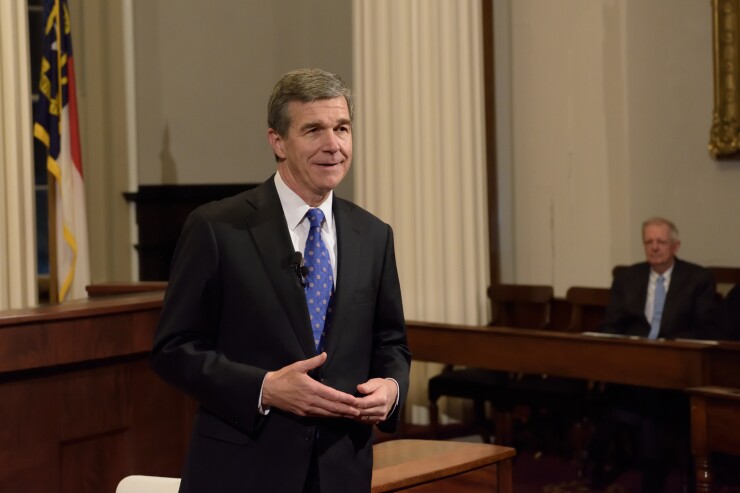North Carolina has approved a new bond program designed to fast-track transportation projects.
Gov. Roy Cooper signed Senate Bill 758 Wednesday, authorizing the North Carolina Department of Transportation to issue up to $3 billion of bonds over the next 10 years backed by state transportation funds.

The Build NC Bond Act will allow the NCDOT to leverage money from the State Highway Trust Fund by issuing bonds to accelerate as many as 350 highway projects.
SB 758 passed the House on a vote of 94-21 on June 12. It passed the Senate 47-0 on June 6.
“Build NC is a bipartisan effort that pulled Republicans and Democrats together to help deliver critical transportation projects to communities more quickly, helping North Carolina attract opportunities and stay competitive,” Cooper said.
The program will allow NCDOT to add 144 local projects to its 2018-2027 transportation plan.
Before lawmakers voted, State Treasurer Dale Folwell unsuccessfully urged lawmakers to require that the Build NC bonds and other bonds being considered by the Legislature be approved by voters in a statewide referendum.
“I’m not against more money for transportation nor am I opposed to the goals of those who support the proposed bonds,” Folwell said in a May 21 statement. “I’m against the issuance of any debt that does not meet my guiding principles. I think we need more transparency so that people can decide whether they want to take on more debt in this environment.”
Folwell said he would have required that all debt be approved by voters and all borrowing adhere to the state’s debt affordability limits.
At the time lawmakers were also considering a $1.9 billion school construction bond program.
Together, the $3 billion of Build NC bonds, $1.9 billion in new school bonds and the $2 billion of Connect NC general obligation infrastructure bonds approved by voters in 2016 would have more than doubled the state’s debt, according to Folwell.
The state issued $200 million of Connect NC bonds in August 2016, and expects to issue $600 million this year, followed by $690 million in 2019, $430 million in 2020, and $80 million in 2021. The GOs are rated triple-A by Fitch, Moody’s and S&P.
The Public School Building Bond Act has not passed either chamber, and the annual session is winding down.
The General Assembly did not ask Folwell to prepare a debt report on the Build NC bond bill or the school bonds, a spokesman for the treasurer said.
The Build NC bonds would leverage the state's Transportation Trust Fund in a way comparable to the way grant anticipation revenue vehicle bonds are backed by revenue from federal transportation grants.
Maturities are capped at 15 years, according to a
“Transportation is the backbone of our state’s economic competitiveness and our quality of life,” said Transportation Secretary Jim Trogdon. “Build NC is a tool that will allow us to continue strong project delivery.”
Build NC will only be used if NCDOT is able to maintain its strong project delivery pace, which increases expenditures and decreases its cash balance, according to the department.
If that balance reaches a certain level, the department can ask the state treasurer to issue up to $300 million in bonds annually over the next 10 years to maintain project delivery at current levels.
North Carolina has about $588 million of outstanding Garvee bonds from a financing program authorized in 2005. The debt is rated A-plus by Fitch Ratings, A2 by Moody's Investors Service, and AA by S&P Global Ratings, according to the treasurer’s
North Carolina issued $1.1 billion of new money Garvees between 2007 and 2011, according to the
“As the keeper of the public purse, I’m in favor of making government simple and streamlining the process for efficiency’s sake,” Folwell said in May. “However, it’s important for the people to understand that this additional debt is being issued at a time when we have almost $50 billion in pension and health care liabilities.”
Folwell’s office issues debt on behalf of the state and manages the North Carolina Retirement Systems, a $100 billion fund that has more than 900,000 members.





